How to Avoid Getting Burned by Chasing Heat in the Market
June 15th, 2023 | Posted in InvestingA Stock Market Ripe for Chasing Heat
Many investors have likely seen statistics highlighting a lack of breadth in equity markets in 2023. This storyline isn’t new. Many readers may remember past years when the ‘FAANG’ and other key technology stocks were the primary drivers of returns. This year, the tech giants are back, with Apple, Microsoft, Nvidia, and Amazon contributing a lion’s share to the S&P 500’s year-to-date return. Meanwhile, more than half of the stocks in the S&P 500 are down for the year.1
For investors, the implication is that if you don’t own these key tech players, then you may also be disappointed with year-to-date returns.
This brings up one of the ‘Zacks Advantages’ of tactical ETF investment. Having ETFs in a portfolio generally gives investors broad ownership of equity markets on a cap-weighted basis—meaning that bigger companies influence returns more than smaller ones do. So, if you own a diversified set of ETFs – as we do at Zacks Advantage – then in all likelihood you also own the key companies driving returns in 2023 in a higher proportion to other companies in the stock market. In other words, depending on your specific allocation, there’s a good chance you’re overweight the outperformers.
A Better Way Forward for Passive Investors
Passive investing using ETFs has become popular, allowing virtually every investor to participate in the stock market with an ETF index fund that tracks the S&P 500. Unfortunately, these funds make it difficult to beat the market—because an index fund essentially is the market.
Zacks Advantage offers a better way forward: We have always been committed to a research-driven investment process, and we have refined our active investment experience to optimize the passive investment realm. Our actively managed robo advisor offers:
- Targeted asset allocation
- Automatic diversification
- Built-in discipline
- Simplified investing – with low fees!
Learn more with our free guide, A Better Way Forward: Actively Managing Passive Index Funds 2
Investors who maybe choose to self-manage, or who own a portfolio of individual stocks, may feel like they’re falling behind if they do not own Nvidia, Apple, Microsoft, and so on.
A good example of how this can look is comparing the year-to-date performance of the Dow Jones Industrial Average to the S&P 500 or the Nasdaq. The Dow is a price-weighted index, meaning that companies with a higher share price – but not necessarily a higher market capitalization – make up a larger share of the index.
For example, United Health Group is the biggest stock in the Dow today because it trades at around $500 a share, and makes up about 9% of the index. Apple is also in the Dow, but since it’s priced around $180 a share, it only makes up about 3% of the index. That means for the Dow, Apple’s strong performance in 2023 is being diluted by United Health Group’s weak performance.
As a result, the Dow is only up about 2% in 2023 while the S&P 500 is up over 10%. Investors experiencing this performance dispersion probably don’t feel great about it. In fact, behavioral finance and neurological studies almost certainly tell us they don’t.
When an investor notices underperformance in a year when the stock market as a whole is doing well, it can create what psychologists call “loss-chasing.” The result is that an investor’s fixation on underperformance leads them to take bigger risks more frequently, often without rigorous analysis since the expediency of making up losses becomes important. Investors often end up making decisions based on what they think will go up the most quickly, which often leads them to stocks that have been outperforming recently. That’s heat chasing.
This behavior is difficult to curb. Neuroscientists have conducted studies showing that when an investor ceases ‘loss-chasing,’ it can activate the part of the brain that is responsible for emotions like pain and disgust. That makes chasing losses, i.e., risk-taking, hard to quit, especially if it means you must resign to feeling awful about it.
Which again brings up the point of heat chasing. Since investors don’t want to feel that pain and disgust, they often give in to the temptation to want to get back to break even quickly, which leads to flawed decision-making that often runs counter to one’s longer-term goals—and also rarely results in consistent success.
Bottom Line for Investors
The lack of breadth in the current market—with a few key names contributing a lion’s share to total index returns—means that investors who don’t own those names may be feeling a sense of urgency to make up lost ground. At worst, a fixation on underperformance can lead to loss-chasing, which we know tends to fly in the face of prudent risk-taking.
For investors who may be experiencing this performance dispersion and/or frustration in 2023, remember that investing is often about accepting losses and remembering that a longer-term, diversified approach is the clearest path to achieving financial goals with appropriate risk and reward balance. Our brains are not wired to let us think that way naturally, so arriving at that conclusion requires effort and resolve. But then again, so does being a successful investor over time.
A key part of avoiding loss-chasing is the ability to zoom out—to focus less on year-to-date 2023 and more on what you want your 10-year annualized return to be. That should be the primary driver of your short-, medium-, and long-term decision-making process.
In recent years, passive investing has become a popular approach, allowing virtually every investor to participate in the stock market with an ETF index fund that tracks the S&P 500.
However, a purely passive approach cannot beat the market (because it basically is the market). That’s why Zacks Advantage offers an actively managed robo advisor that:
- Invests exclusively with ETFs
- Uses technology to recommend the appropriate mix of equities and bond ETFs to help achieve your investing goal and specific risk tolerance
- Lowers fees and expenses
Get our free guide, A Better Way Forward: Actively Managing Passive Index Funds, to learn the 4 issues that can hold back returns for passive investors, and how Zacks Advantage can help you overcome them.
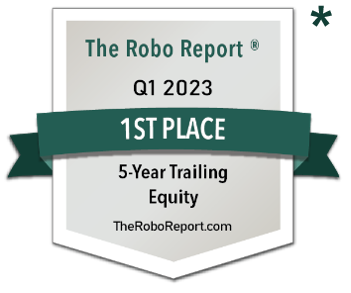
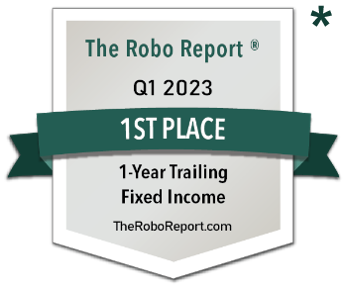
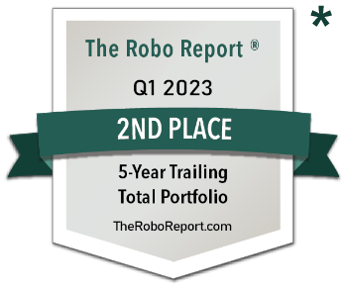
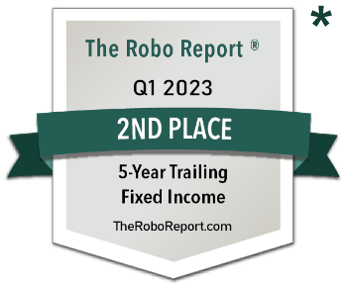
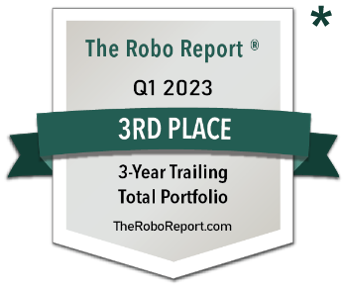
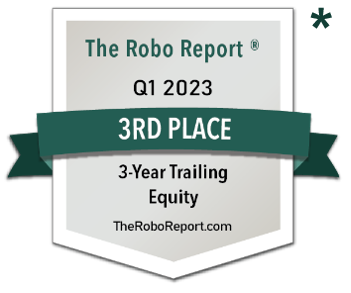
*This rating was awarded by The Robo Report on 4/1/2023 in respect of the period 1/1/2023 to 4/1/2023. We do not compensate The Robo Report to obtain this rating. However, we pay compensation to the Robo Report to use their logo in connection with advertising this rating.
© 2023 Zacks Advantage | Privacy Policy | Unsubscribe
1 Wall Street Journal. May 19, 2023.
2 Zacks Investment Management may amend or rescind the A Better Way Forward: Actively Managing Passive Index Funds guide offer for any reason and at Zacks Investment Management’s discretion.
3 Zacks Investment Management may amend or rescind the A Better Way Forward: Actively Managing Passive Index Funds guide offer for any reason and at Zacks Investment Management’s discretion.
DISCLOSURE
Past performance is no guarantee of future results. Inherent in any investment is the potential for loss.
Zacks Advantage is a service offered by Zacks Investment Management, a wholly-owned subsidiary of Zacks Investment Research.
Zacks Investment Management, Inc. is a wholly-owned subsidiary of Zacks Investment Research. Zacks Investment Management is an independent Registered Investment Advisory firm and acts as an investment manager for individuals and institutions. Zacks Investment Research is a provider of earnings data and other financial data to institutions and to individuals.
This material is being provided for informational purposes only and nothing herein constitutes investment, legal, accounting or tax advice, or a recommendation to buy, sell or hold a security. Do not act or rely upon the information and advice given in this publication without seeking the services of competent and professional legal, tax, or accounting counsel. Publication and distribution of this article is not intended to create, and the information contained herein does not constitute, an attorney-client relationship. No recommendation or advice is being given as to whether any investment or strategy is suitable for a particular investor. It should not be assumed that any investments in securities, companies, sectors or markets identified and described were or will be profitable. All information is current as of the date of herein and is subject to change without notice. Any views or opinions expressed may not reflect those of the firm as a whole.
Any projections, targets, or estimates in this report are forward looking statements and are based on the firm’s research, analysis, and assumptions. Due to rapidly changing market conditions and the complexity of investment decisions, supplemental information and other sources may be required to make informed investment decisions based on your individual investment objectives and suitability specifications. All expressions of opinions are subject to change without notice. Clients should seek financial advice regarding the appropriateness of investing in any security or investment strategy discussed in this presentation.
Certain economic and market information contained herein has been obtained from published sources prepared by other parties. Zacks Investment Management does not assume any responsibility for the accuracy or completeness of such information. Further, no third party has assumed responsibility for independently verifying the information contained herein and accordingly no such persons make any representations with respect to the accuracy, completeness or reasonableness of the information provided herein. Unless otherwise indicated, market analysis and conclusions are based upon opinions or assumptions that Zacks Investment Management considers to be reasonable. Any investment inherently involves a high degree of risk, beyond any specific risks discussed herein.
The S&P 500 Index is a well-known, unmanaged index of the prices of 500 large-company common stocks, mainly blue-chip stocks, selected by Standard & Poor’s. The S&P 500 Index assumes reinvestment of dividends but does not reflect advisory fees. The volatility of the benchmark may be materially different from the individual performance obtained by a specific investor. An investor cannot invest directly in an index.
Robo investments are subject to some unique risks, including, but not limited to, the fact that investment decisions are made by algorithms based on investors’ answers to questions, there is a lack of human involvement, and there is the possibility that the software may not always perform exactly as intended or disclosed. Such investment programs are only suitable for investors who can bear the risk of a complete loss of their investments.
The S&P GSCI is the first major investable commodity index. It is one of the most widely recognized benchmarks that is broad-based and production weighted to represent the global commodity market beta. The index is designed to be investable by including the most liquid commodity futures, and provides diversification with low correlations to other asset classes. The volatility of the benchmark may be materially different from the individual performance obtained by a specific investor. An investor cannot invest directly in an index.
The NASDAQ-100 Index includes 100 of the largest domestic and international non-financial companies listed on The NASDAQ Stock Market based on market capitalization. The Index reflects companies across major industry groups including computer hardware and software, telecommunications, retail/wholesale trade and biotechnology. Index composition is reviewed on an annual basis in December. An investor cannot invest directly in an index. The volatility of the benchmark may be materially different from the individual performance obtained by a specific investor.
Zacks Investment Management 10 S. Riverside Plaza, Suite 1600 Chicago IL 60606-3830
Past performance is no guarantee of future results. Inherent in any investment is the potential for loss
Zacks Advantage is a service offered by Zacks Investment Management, a wholly-owned subsidiary of Zacks Investment Research. Zacks Investment Management is an independent Registered Investment Advisory firm and acts as an investment manager for individuals and institutions. All material in presented on this page is for informational purposes only and no recommendation or advice is being given as to whether any investment or strategy is suitable for a particular investor. Nothing herein constitutes investment, legal, accounting or tax advice. The information contained herein has been obtained from sources believed to be reliable but we do not guarantee accuracy or completeness. Zacks Investment Management, Inc. is not engaged in rendering legal, tax, accounting or other professional services. Publication and distribution of this article is not intended to create, and the information contained herein does not constitute, an attorney- client relationship. Do not act or rely upon the information and advice given in this publication without seeking the services of competent and professional legal, tax, or accounting counsel.

